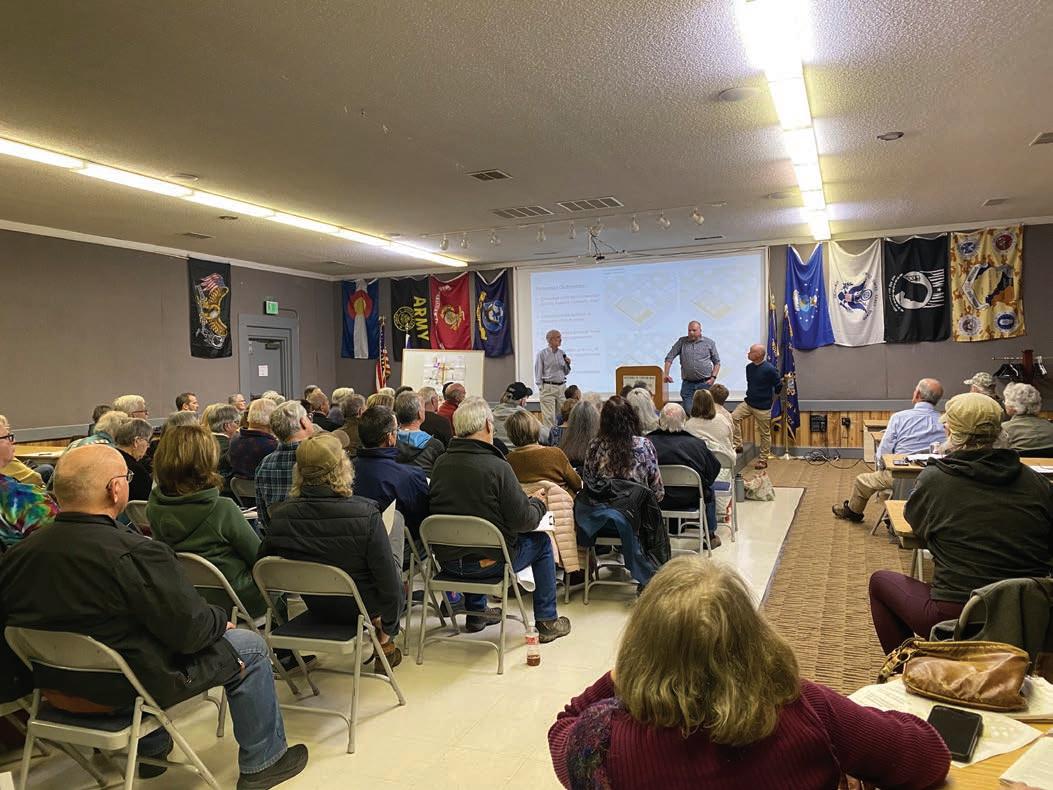
4 minute read
Littleton High School parents reflect on lockdown Communication, strategy discussed
BY NINA JOSS NJOSS@COLORADOCOMMUNITYMEDIA.COM
When Littleton High School ninth grader Osso Siddall heard lockdown alarms begin during his lunch period, he did the safest thing he could think of — he ran.
“ e lockdown alert sounded, and then everybody was just screaming and confused,” he said. “And then I heard someone, I think it was like a sta member, said something about somebody was in the building… So I got out of there as fast as I could.” ree blocks and a couple hundred rapid heartbeats later, he arrived at his home. His mother, Mary Siddall, knew something was wrong right away when her son opened the door, out of breath.
SEE LOCKDOWN, P6
• R-1-A, which means the properties typically have a larger lot size.
• R-1-B, which typically represents a medium lot size.
• R-1-C, which typically represents a smaller lot size.
Councilmember Rita Russell, who has raised concerns about this idea during previous council meetings, spoke during the town hall.
“I realized our forefathers built an incredible zoning plan for this city, and … they build zoning plans for reasons. ey want dangerous things in one area of the city so that, in residential areas, you’re not impacted by that,” Russell said. “And so, I feel, it’s a great plan.”
“I’m gonna tell you, zoning is the protection of our private property rights. If we, as a city council, change the zoning, we are going to limit your private property rights,” she added.
Russell described the project to attendees and said one of the proposed ideas is that if, for example, a fourplex was built, three of the units would be market rate and the fourth unit would be required to be a ordable.
“I don’t know that city council really has the authority to do that,” she said. “Density will not make housing a ordable. It will create exactly the opposite e ect. And so what is currently being discussed will not x the problem that we have.”
Englewood resident Kurt Suppes raised doubts that the zoning change would increase the a ord- ability of housing, saying the duplexes he has seen in the city are expensive.
“ e numbers on this do not work,” Suppes said. “ ere’s no way to make this situation work other than to destroy the neighborhoods that we live in. at’s the only real thing that can happen.”
A week before this town hall, the night of Feb. 23, council members Joe Anderson and Chelsea Nunnenkamp held an “A ordable Housing Town Hall” at the Englewood Civic Center to discuss the CodeNext project.
At that meeting, Nunnenkamp said there are currently four members of the seven-person council who are supportive of considering what these changes may look like, including herself and Anderson.
Anderson said one of the primary aims of the R-1 zoning change is to increase the overall housing supply. He explained the council still does not know many details regarding the potential allowance of two-to-fourunit buildings on certain lots in R1-A, R-1-B and R-1-C zone districts.
“We don’t want every R-1-A lot to be open to this development,” he said. “What we’re looking at, and still trying to decide on, and will discuss at future meetings is: What is an appropriate lot size for the different zone districts?”
Some residents, however, are skeptical that the city council is only considering this change in a limited capacity.
“ ey’re gonna take what they can get, right? ey’re gonna set this thing up to where it looks like, well, it’s only a couple of units or a couple of properties on each corner, right?” Suppes said. “We’d be naive to be sitting here thinking that that’s what it’s going to be.”
A concern of some residents is how the development of these multifamily units will impact the property value of nearby homes and whether it will decrease the value of their homes.
Another issue residents voiced is the city’s infrastructure and its ability to serve a higher density of people. Increased parking issues that could arise with the higher density was also a worry some residents expressed.
“It will change the way that our neighborhoods look and feel and the way we live, irreparably. You cannot change and go back to an R-1-A, or B, or C once those types of changes start,” Suppes said.
Given the concerns about the potential impacts of such a zoning change, some residents have come together to form the group, Citizens of Englewood for Responsible Zoning, of which Englewood resident Rick Emmelhainz is the chair. e group has a website, stopenglewoodopoly.com.
One resident at the town hall said she helped submit a citizens’ initiative for a ballot measure so that residents can vote on this issue in a special election. She said the submission was still waiting for approval.
Another resident, Barry Lancaster, said he will be interviewing a couple of law rms, saying there are rms that specialize in injunctive relief. Injunctive relief, also called an injunction, is a court order that prohibits a party from taking a speci c action or requires a party to act in a certain way.
“ is, I think, is the most direct option that we have to stop this — is litigation and getting injunctive relief to keep this from being rammed down our throats,” Lancaster said.

“We’re worried about the equity of our homes decreasing, the quality of our neighborhoods decreasing — and to protect that, we may have to put money to hire someone that can stop this.”
Kirk Vanino, who lives on a large corner lot, pointed out commercial areas the city could consider redevelopment on rather than in R-1 zone districts.
“Why would we take down a house that’s existing to create more housing if we have a housing shortage? at’s gonna be more expensive to build anyway,” Vanino said. “Why not do it somewhere where the real estate (is) past its prime, it’s not functioning anymore?” ose who are interested in contacting their city council member can nd their contact information listed on the city’s website: englewoodco.gov/government/citycouncil.
Russell encouraged those at the town hall to get involved and attend city council meetings.
“Whether you think it’s impacting the city council or not, you are impacting the city council. And I appreciate your support. e only way we’re gonna get this done is if we all stick together,” Russell said.
Residents who are interested in learning more about the CodeNext Project can visit engaged.englewoodco.gov/codenext.
According to the project’s website, the city council will discuss CodeNext during its March 13 city council study session, which residents can attend in person or watch via YouTube.









